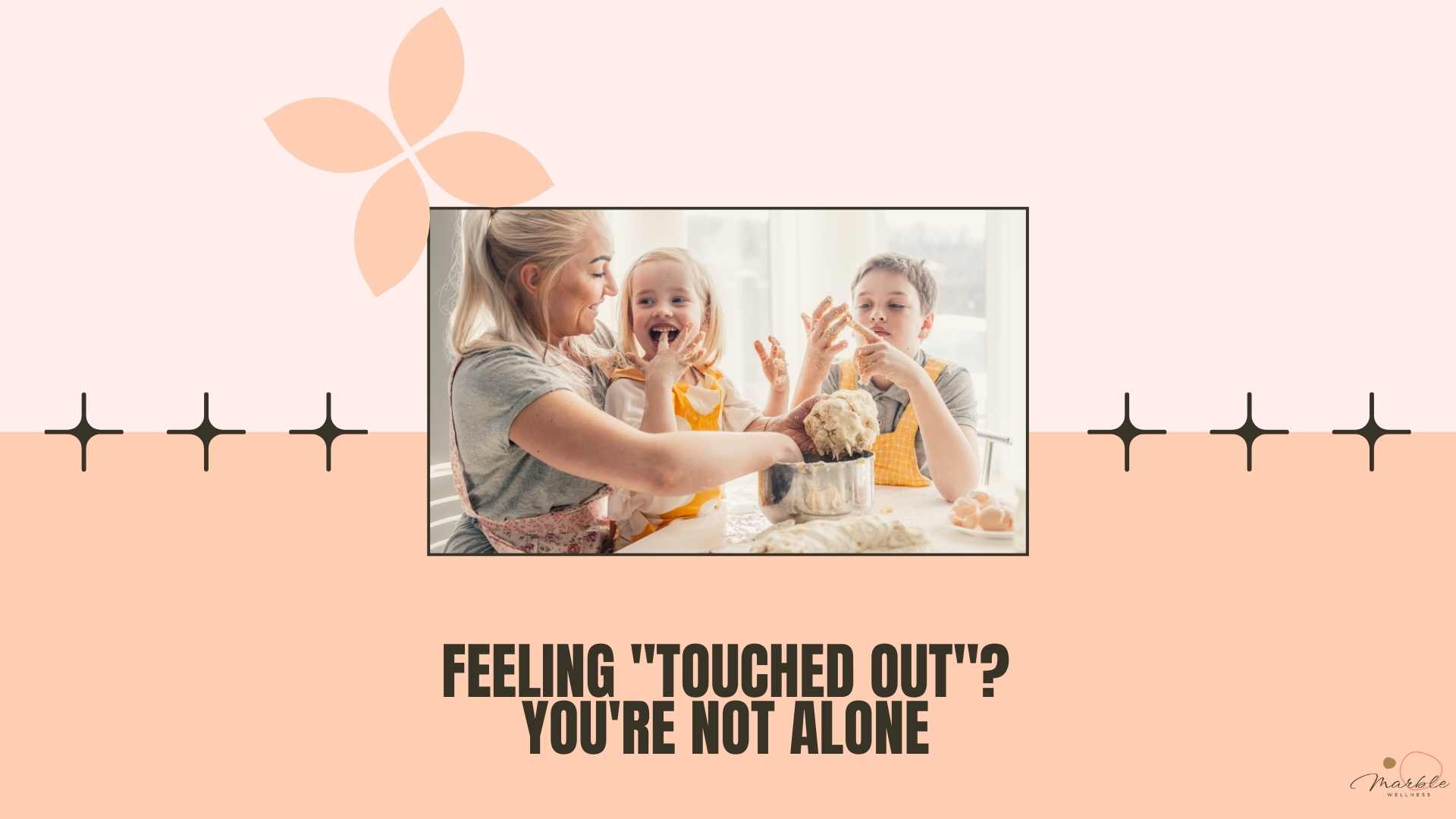If you’re a mom feeling like you’ve hit your limit on touch—whether from sticky little hands, endless hugs, or even romantic touch from your partner—you’re definitely not alone. For so many moms, the physical demands of motherhood can create a sensation of being “touched out,” which often leads to feelings of irritability, frustration, and sometimes even guilt. Let’s talk about why this happens, how it can affect intimacy, and ways to balance your own needs with those of your partner.
Why Am I Feeling Touched Out?
Motherhood is a constant source of physical closeness, especially with younger children. The demands of comforting, feeding, holding, and simply being there for your kids can drain your physical and emotional capacity for touch. It’s like you’re giving 100% of your touch capacity to your kids, and by the end of the day, there’s just nothing left in the tank. Even a gentle hand on the shoulder from a loved one can feel like too much.
This “touched out” feeling is a perfectly normal response to the physical demands of parenting and the body’s need to protect its boundaries. I want you to read that again, because even as a therapist, the phrase “body’s need to protect its boundaries” hits me hard.
Just like any resource, your physical energy is finite—and motherhood, especially in the younger years, uses a lot of it.
Intimacy and the “More” Factor
One of the biggest struggles for moms feeling touched out is intimacy. When any physical contact feels like it’s going to lead to “more,” it can set off an automatic defensive response. A hug, kiss, or caress might normally feel comforting, but if you’re already maxed out, it can start to feel like one more thing you have to give.
This reaction is often rooted in the fear of “more” and the feeling of needing to protect what little personal space you have left. Many moms start feeling defensive or even irritable, which can lead to distance in the relationship. It’s important to communicate openly about this reaction with your partner, so they understand that it’s not a lack of love or desire—it’s a natural response to the intense physical demands of parenting.
This sense of overwhelm can also create tension when your physical and emotional limits don’t align with your partner’s needs, leading to another common challenge: mismatched desires.
Mismatched Desires and Needs
Another common challenge is the mismatch of desire and physical need between partners. While one partner may crave touch as a way of reconnecting and bonding, the other may be at their physical limit and just want a moment alone to decompress. This can create a rift between couples, especially if the “touched out” partner feels guilty or misunderstood.
It helps to acknowledge that both experiences are valid: one partner may have a genuine need for physical closeness, while the other has a genuine need for space. Finding a balance between these needs can take time, understanding, and patience from both sides.
While it may feel challenging to find the middle ground when you’re at your limit, there are ways to create a balance between your needs and your partner’s. Here are some practical steps to reclaim your space while preserving intimacy
Tips to Reclaim Your Physical Space (and Keep Intimacy Alive)
So, what can you do if you’re feeling touched out? Here are a few tips to help restore balance:
- Set Small, Clear Boundaries: If you’re feeling maxed out, let your partner know when you need a little space. You can say something like, “I’m feeling really over-touched right now; can I have 10 minutes to just breathe?” Clear boundaries don’t push love away—they help you stay connected on terms that feel good for both of you.
- Non-Physical Acts of Affection: Affection doesn’t always have to mean physical touch. Consider showing love in other ways, like through words, small acts of kindness, or quality time. These can be just as meaningful and help keep the connection strong.
- Redefine Intimacy in Phases: Be open to shifting what intimacy looks like based on what you’re both comfortable with at any given time. Whether it’s sharing a quiet moment together, making each other laugh, or just talking at the end of the day, find ways to connect that honor your physical and emotional capacity.
- Communicate Regularly and Gently: Frequent, gentle conversations can help both of you understand and respect each other’s needs. You may be surprised at how much compassion a partner shows when they truly understand the impact of being touched out.
- Small, Intentional Touches: For some moms, short, intentional moments of touch—without the expectation of “more”—can feel okay. A brief hug, a quick hand squeeze, or even a playful touch that’s light and pressure-free can bring closeness without overwhelming you.
On the Other Side: Embracing the Balance
Being touched out doesn’t mean you’ll always feel this way, and it certainly doesn’t mean you’re failing as a mom or partner. This stage, like so many in motherhood, is one where your needs and boundaries are evolving. Embracing this balance and communicating openly about it can bring a surprising sense of relief and connection, helping you and your partner navigate this phase with respect, compassion, and a new understanding of intimacy.
This is such a relatable struggle! When you’re “touched out” but still have a little one who relies on you for constant physical closeness, it can feel like a tricky balance between meeting their needs and protecting your own energy. Here are some ways to help manage that touch overload while still giving your little one the affection and comfort they crave:
Feeling Touched Out with Your Kids
That feeling of being “touched out” doesn’t stop with your partner—it can extend to your children, too. After a long day of holding, feeding, rocking, and comforting, even the sweetest toddler snuggles can feel overwhelming. While your little one might rely on you for constant physical closeness, it’s okay to acknowledge that your touch capacity has limits. The challenge is finding ways to meet your child’s needs for affection and comfort while also protecting your own boundaries and your sanity.
Here are some tips you can try to maintain your physical boundaries with your children, while still allowing attachment and healthy bonding:
1. Create a “Hands-Free” Bonding Routine
Even if your toddler needs to be close to you, there are ways to connect that don’t involve holding or rocking. Try cozying up with them on the couch or floor, snuggling side by side with a soft blanket, or reading together while they’re seated next to you rather than on you. You’re still giving them that comforting closeness, but you’re creating just a little extra breathing room for yourself.
2. Get a Comforting Transition Object
Introducing a comforting toy or blanket for your toddler to cuddle can help them get some of that soothing touch they need, even when they’re not directly in your arms. You can make it a special item by snuggling with it together a few times, so it starts to carry your scent and warmth. Over time, they may start reaching for this object for comfort as much as they reach for you!
3. Tag Team When Possible
If there’s another caregiver available, let them take over some of the physical caregiving when you’re feeling especially touched out. This could mean asking a partner, friend, or family member to step in for the bedtime rocking or the fifth round of holding that day. Sharing the load, even just for a few minutes, can help recharge you and keep the routine going for your little one.
4. Practice Mindful Touch
When you’re with your toddler and the touches start to feel overwhelming, try to take a few deep breaths and mindfully remind yourself why this closeness matters. By mentally focusing on the connection rather than the physical sensation, you may find it easier to manage and less likely to feel overloaded. Visualizing these moments as short, intentional ones can help shift your focus and let you be fully present.
5. Introduce Independent Play with Proximity
Encouraging your little one to play independently can give you a breather while they still feel close. Set up an activity they love (like stacking blocks, coloring, or playing with soft toys) nearby. Sit on the floor with them but allow them to explore and play within a safe, small space. They’ll feel your presence without needing the constant touch, and you get a few moments to breathe and reset.
6. Take Mini-Touch Breaks Throughout the Day
Even a few seconds to yourself can go a long way in managing touch overload. Step into the bathroom, stretch your arms or just stand in a different room for a few breaths. These “micro breaks” may seem small, but giving yourself little resets can help prevent the all-too-common buildup that happens when your toddler is extra clingy.
Balancing your toddler’s needs with your own boundaries isn’t always easy, but remember: taking these moments to protect your own space can actually make you feel more present and connected when you *are* offering that closeness. And if you feel overwhelmed, that’s perfectly okay—remember, being touched out doesn’t mean you don’t love them with everything you’ve got. It simply means that even the most dedicated moms need space sometimes, too.
Therapy for Moms in St. Louis, MO
Feeling touched out doesn’t mean you’re failing as a mom, partner, or person—it simply means you’re human. The physical demands of parenting can be intense, but they’re just one part of the journey. By setting boundaries, communicating openly, and embracing new ways to connect, you can find a balance that works for you and your family. Remember, these feelings won’t last forever, and with time, patience, and self-compassion, you’ll discover that moments of closeness can feel joyful again. You’ve got this.
If you live in St. Louis and are ready to improve your mental health, we are here to help. Reach out to our team of maternal mental health specialists in Ballwin, MO to get the support you need!
Contact Us!
Learn About Our Group Offerings

Additional Counseling Services at Marble Wellness in St. Louis, MO
Our counseling services are designed to help set you on a path of living a more fulfilled, calm, and happy life. Our incredible team of STL-based therapists has a variety of training backgrounds and areas of expertise. We specialize in anxiety, depression, grief, chronic illness, therapy for men, couples, and maternal overwhelm. Our practice also helps new moms with various postpartum concerns, moms in the thick of parenting, and moms with teens. We can also chat from wherever you are in the state with online therapy in Missouri. No matter where you are in your mental health journey, we would love to support you.



